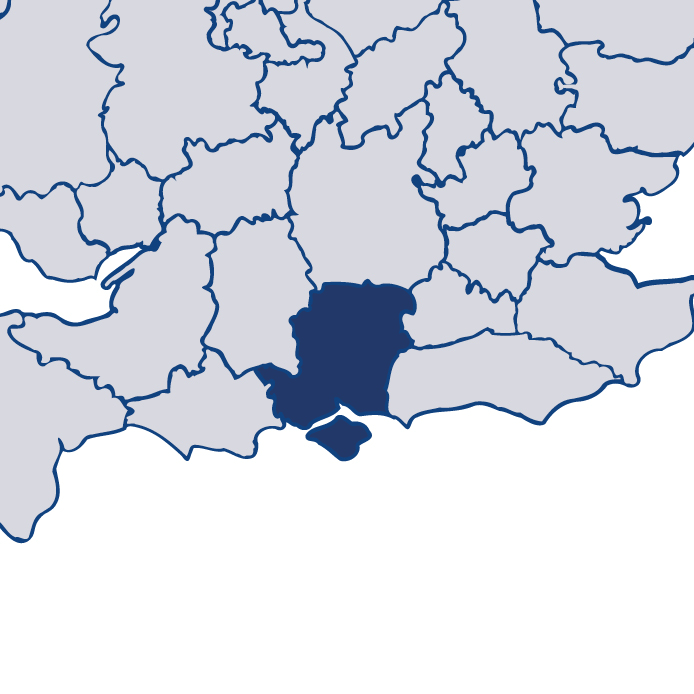Hampshire 2014
Read more about HampshireThis is the first PEEL Assessment of Hampshire Constabulary. In making this assessment I have used my professional judgment to consider the evidence available from inspections undertaken in the past 12 months.
The available evidence indicates that:
in terms of its effectiveness, in general, the force is good at reducing crime and preventing offending, good at investigating offending and good at tackling anti-social behaviour;
the efficiency with which the force carries out its responsibilities is good; and
the force is acting to achieve fairness and legitimacy in some of the practices that were examined this year.
HMI's observations
In making this first PEEL Assessment of Hampshire Constabulary I have taken into account the challenges to policing Hampshire and the Isle of Wight.
There are 14 local authorities within the force area which includes the major cities of Portsmouth and Southampton, with their ports, colleges and universities, busy nightlife and major football clubs. The area also includes the Isle of Wight and large rural areas, some of which are among the UK’s most affluent areas. The county has a thriving tourist industry which is based around historic market towns, seaside resorts and the New Forest.
I have been impressed that the force continues to focus on putting victims at the centre of policing. The force works well with local partners, such as councils, to provide a joined up response to tackling and reducing anti-social behaviour.
I have also been encouraged by the force’s response to the financial challenges it has faced, achieving the required level of savings while protecting neighbourhood policing as far as possible, and increasing the proportion of staff and officers in frontline crime fighting roles.
Although crime investigations are generally carried out to a satisfactory standard, there is some room for improvement in ensuring a consistent quality through better supervision so that opportunities to gather the best evidence are not missed and that victims’ needs are consistently met.
Despite the force’s strong performance in many areas, I have serious concerns about its approach to crime-recording which is not as accurate as it should be.
Our intention is to examine leadership specifically as part of future PEEL Assessments, once criteria have been established. This will allow us to take account of the College of Policing review of leadership that is currently underway.
In common with other forces, there is a need to develop a better understanding of the changing demands for police services.
Over the past 12 months, there have been a number of inspections made of Hampshire that have suggested there is focus on making victims safer, but although most investigations are of a satisfactory standard, these could be improved through better supervision.
I will be interested to see how the force responds to the areas HMIC has identified for improvement over the next 12 months. In particular I will be monitoring the success of the steps the force is already taking to improve the accuracy of its crime-recording practices, and what effect, if any, the ongoing internal reorganisation has on the service to the force provides to the public.
Effectiveness
How well the force tackles crime
Hampshire Constabulary is good at reducing crime and preventing offending. The force is good at investigating offending. It is good at tackling anti-social behaviour.
HMIC found that Hampshire Constabulary has a good track record in cutting crime. There is a strong emphasis on reducing crime and anti-social behaviour and preventing offending. The area has seen some large reductions in crime and rates have fallen faster here than across England and Wales over the past four years.
There is a continued focus on putting victims at the centre of policing. There is clear leadership within the force for the drive to place victims and witnesses at the heart of policing and the wider criminal justice system.
HMIC found that investigations are generally carried out to a satisfactory standard, although there is some room for improvement in ensuring a consistent quality through better supervision so that opportunities to gather the best evidence are not missed, and victims’ needs are consistently met.
The force works well with local partners to provide a joined up response to tackling and reducing anti-social behaviour.
Further insights on effectiveness
The domestic abuse inspection found that tackling domestic abuse is a priority for Hampshire and its police and crime commissioner, and that staff demonstrated a good level of commitment and awareness. It found that high-risk victims of domestic abuse received a good level of service, but that this was not the case for incidents assessed as standard-risk. The crime inspection found some inconsistency in the level of service for incidents assessed as standard-risk.
The crime inspection found that the investigation and management of organised crime groups was limited in its effectiveness, and that neighbourhood teams were not as aware or as involved as they could be. Progress in emerging areas such as cyber-crime lacked momentum due to limited knowledge and training.
Efficiency
How well the force delivers value for money
Hampshire Constabulary has responded well to the challenge of the spending review. It is well placed to respond to future funding reductions in this ongoing era of austerity.
Hampshire Constabulary is on track to achieve its required savings of £52.9m over this spending review period. It has plans in place that will achieve further savings in 2015/16, and is developing its plans for the period beyond 2016. Importantly, in making its required savings the force is protecting neighbourhood policing as far as possible, and increasing the proportion of staff and officers in frontline crime fighting roles.
The force understands the issues it faces and is looking beyond the current spending review, taking action now by planning for future funding reductions and other cost pressures.
Despite the reductions in staffing numbers, the force has continued to fight crime and keep its communities safe. It has achieved higher reductions in crime, both over the spending review period and during the last 12 months to March 2014, than most other forces. Overall, crime levels remain lower than in other forces in England and Wales and the force has increased victim satisfaction over the 12 months to March 2014.
Legitimacy
Does the force act with integrity and provide a service the public expects?
The chief constable demonstrates strong leadership on standards and professional behaviour. Most staff know the standards expected of them, although the force needs to do more to ensure that staff understand the principles of professional behaviour, and these need to be reinforced by supervisors. The force has systems in place to enable it to respond to intelligence about corruption or unprofessional behaviour. However, it needs to develop its preventive investigative work to detect and deter any internal corrupt practices.
Further insights on legitimacy
The Crime Survey for England and Wales (12 months to March 2013) found that the proportion of respondents that think that the force does an excellent/good job was broadly in line with the figure across England and Wales. The same survey over the same period also found that the proportion which agrees that the force deals with local concerns was greater than the figure for England and Wales. The force’s own victim satisfaction survey (12 months to June 2014) found that the proportion of victims who were satisfied with their experience was greater than the figure across England and Wales.
The inspection on domestic abuse found that call-handlers were empathetic and understood the questions they needed to ask, despite not having received training recently. However, responding officers received limited background information before attending incidents.
As a result of the crime data integrity inspection, HMIC is seriously concerned that a notable proportion of reports of crime are not being recorded, and this means that victims of crime are not receiving the service they should when they first report a crime.
HMIC is also concerned with the accuracy of the decisions taken by the force when making no-crime decisions (cancelling a recorded crime) as too many of these are incorrect. The force needs to take action to improve, serve the victims of these crimes and provide the public with confidence in the force’s crime data.
Key facts – 2019/20

Force Area
Population
Workforce
Victim-based crimes
Cost
Points of context provided by the force
The area includes Portsmouth and Southampton, with their ports, colleges and universities, busy nightlife and major football clubs.
The force is reorganising its workforce, embracing technology, and collaborating with other forces and local partnerships.
Police and crime plan priorities
The force is reorganising its workforce, embracing technology, and collaborating with other forces and local partnerships.
This Police and Crime Plan outlines my vision and priorities for policing and community safety across Hampshire and the Isle of Wight. It is my opportunity to show how I intend to keep the promise I made to our communities when I took office – ensuring that the police and other partners are able to continue cutting crime and protect the public. I am committed to working with partners and stakeholders to ensure the safety of the community and delivery of effective criminal justice” – Simon Hayes, Police and Crime Commissioner for Hampshire and the Isle of Wight





